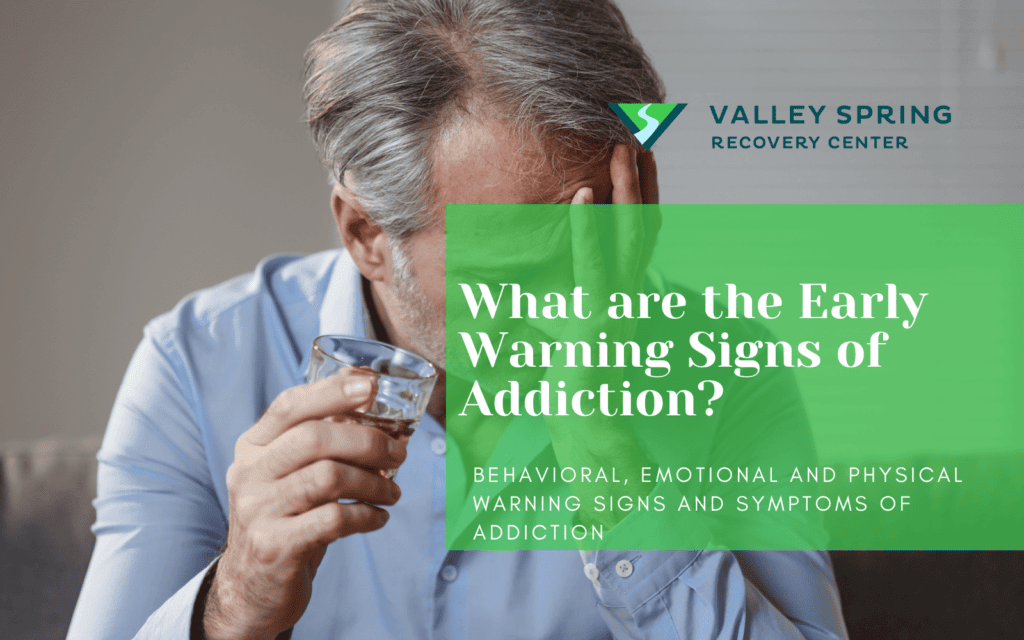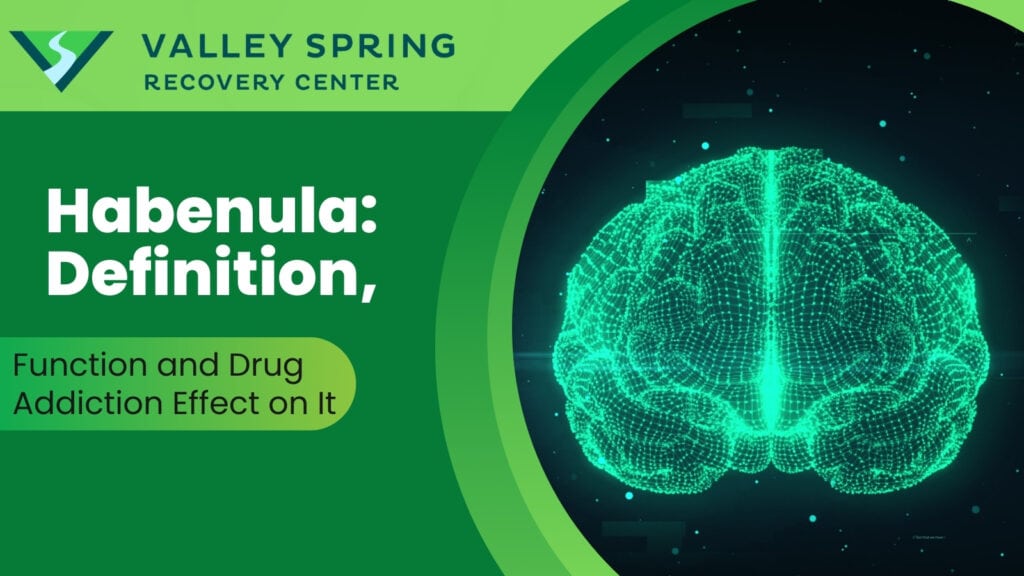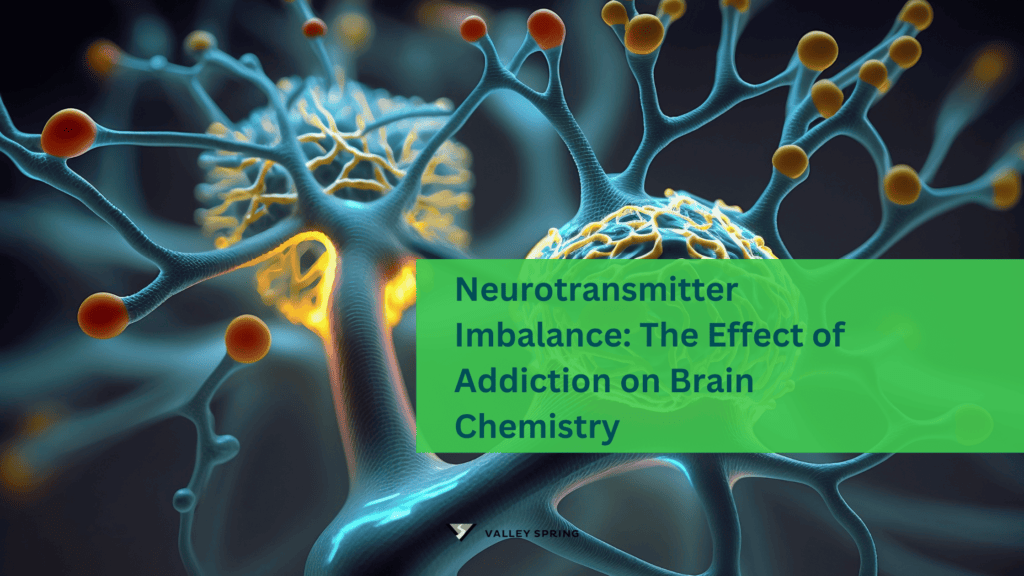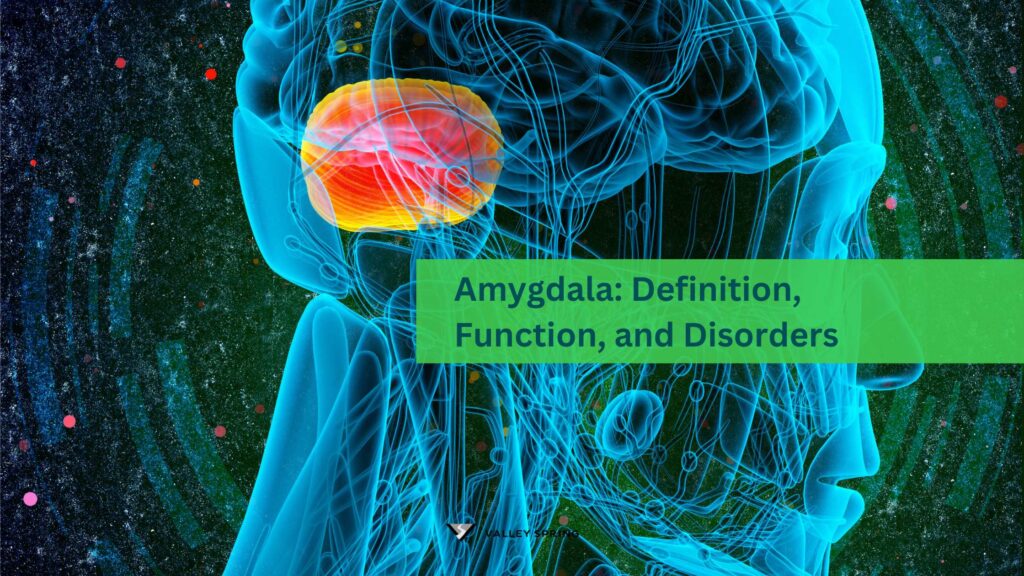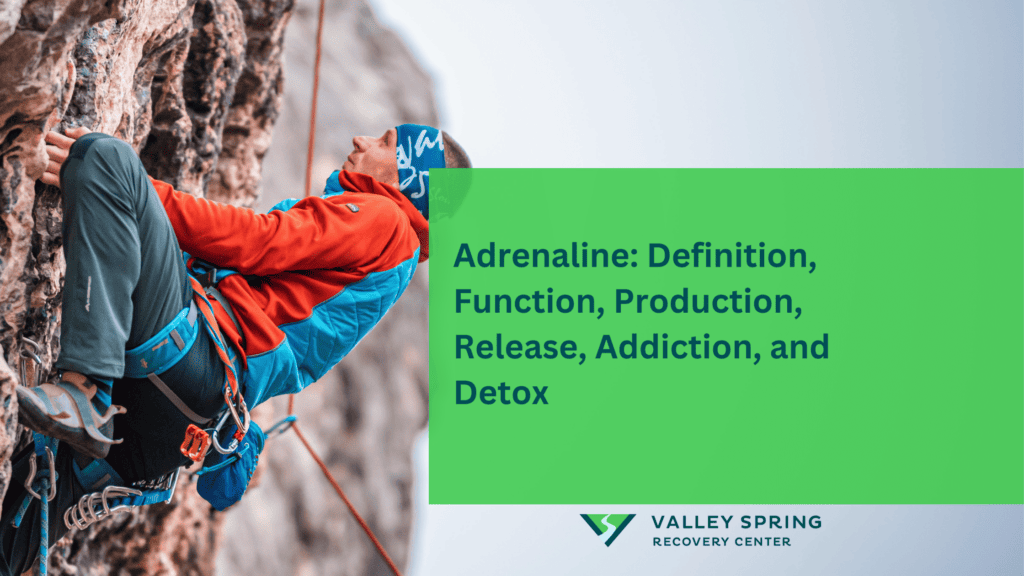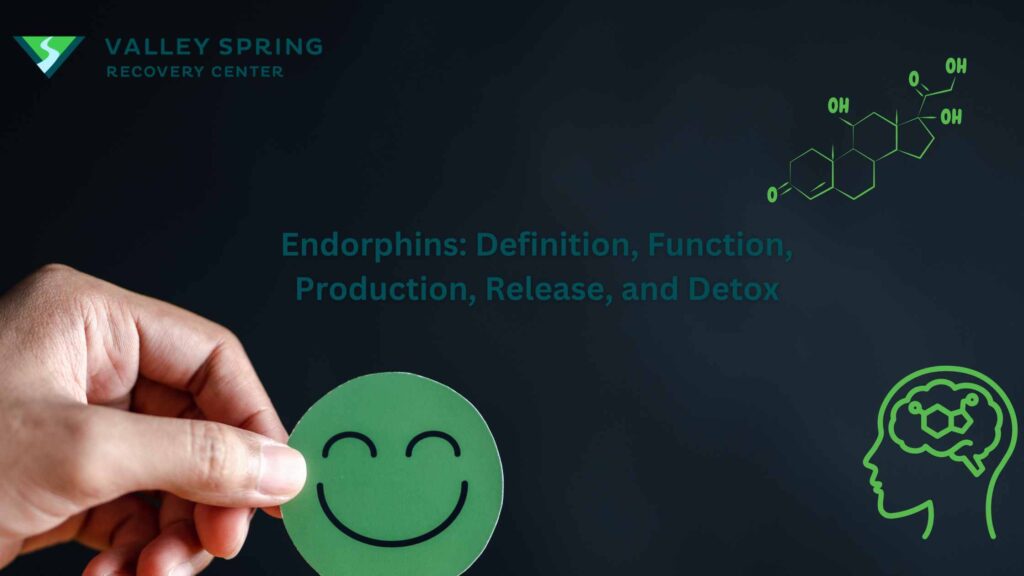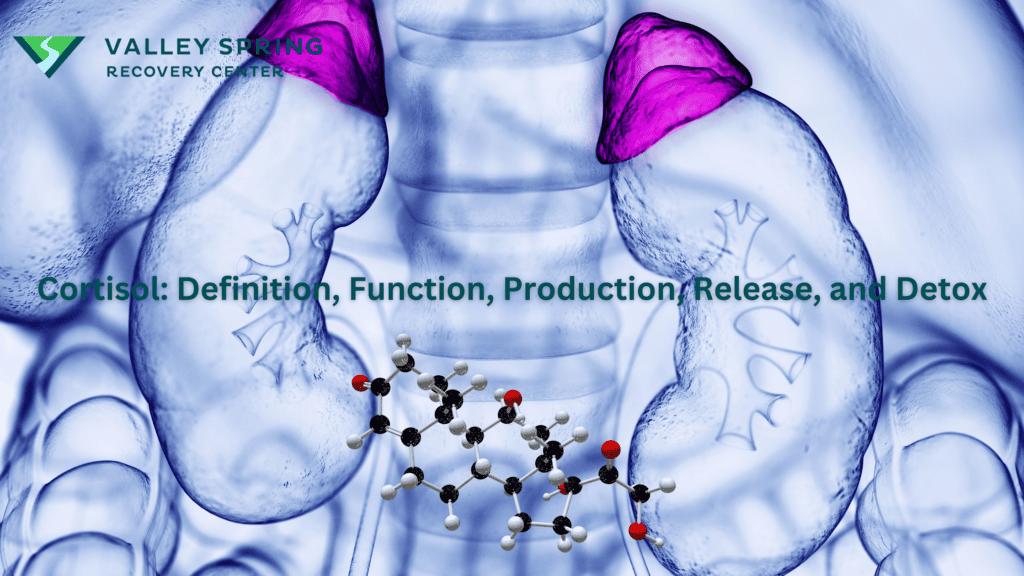The early warning signs of addiction are pivotal for intervention, encompassing emotional, behavioral, and physical changes that signal the urgency of treatment to avert further mental and health disorders. Notably, behavioral shifts like secretive actions, neglect of duties, and legal issues, alongside physical symptoms such as bloodshot eyes and unusual odors, are clear indicators. Additionally, psychological alterations, including mood swings and depression, underscore the critical nature of recognizing these signs early to facilitate effective treatment and recovery, thereby minimizing the risk of relapse and promoting a healthier lifestyle.
Emotional and Behavioral Changes
Behaviorally, a person might engage in secretive or suspicious behaviors which denote signs of addiction. There might be repeated neglect of responsibilities at work, school, or home. Drug addiction often leads to frequent legal troubles; this behavior pattern is a clear early warning sign of substance use disorder.
A person struggling with substance use often fails to recall events during episodes of drinking, a phenomenon known as blackouts. This is a common sign associated with alcohol use. Repeated conflicts with family members, friends or co-workers signify the onset of mood swings and irritability, strongly hinting at possible addiction.
A person, under the influence of drugs or alcohol, might use alcohol regularly to relax, improve mood, deal with problems or simply to feel “normal”.
Here are some common Emotional and Behavioral changes:
- Engaging in secretive or suspicious behaviors
- Frequently getting into legal trouble
- Neglecting responsibilities at work, school, or home
- Sudden change in friends, favorite hangouts, and hobbies
- Unexplained need for money or financial difficulties
- Life revolving around drug use
- Abandoning enjoyable activities to use drugs
- Continuing to use it regardless of negative consequences
- Appearing fearful, anxious, or paranoid, with no reason
- Lack of motivation; appearing tired or “spaced out”
- Sudden mood swings, increased irritability, or angry outbursts
- Unexplained change in personality or attitude
Physical Changes
The early warning signs of addiction often manifest physically, including bloodshot eyes, changes in pupil size, variations in appetite or sleep patterns, and deterioration of personal grooming habits. Additionally, individuals exhibit unusual odors on their breath, body, or clothing. Specific physical signs and effects associated with addiction include sudden weight gain or loss, runny nose or sniffling, tremors, slurred speech, impaired coordination, red-faced complexion, trembling hands, and nosebleeds. Seizures may also occur as a result of drug or alcohol abuse.
Here are some physical changes you can see as a sign of using drugs:
- Bloodshot eyes
- Changes in pupil size
- Variations in appetite or sleep patterns
- Deterioration of personal grooming habits
- Unusual odors on breath, body, or clothing
- Sudden weight gain or weight loss
- Runny nose or sniffling
- Tremors
- Slurred speech
- Impaired coordination
- Red-faced and ruddy complexion
- Trembling hands
- Nosebleeds
- Seizures
Psychological Changes
Several psychological changes may indicate the onset of addiction. These signs often manifest before the physical consequences become apparent.
Here are some key psychological changes that can serve as early warnings:
- Changes in personality, typically becoming moodier or experiencing mood swings
- Losing interest in activities and hobbies
- Becoming increasingly withdrawn and secretive
- Depression and hopelessness
- Suicidal thoughts
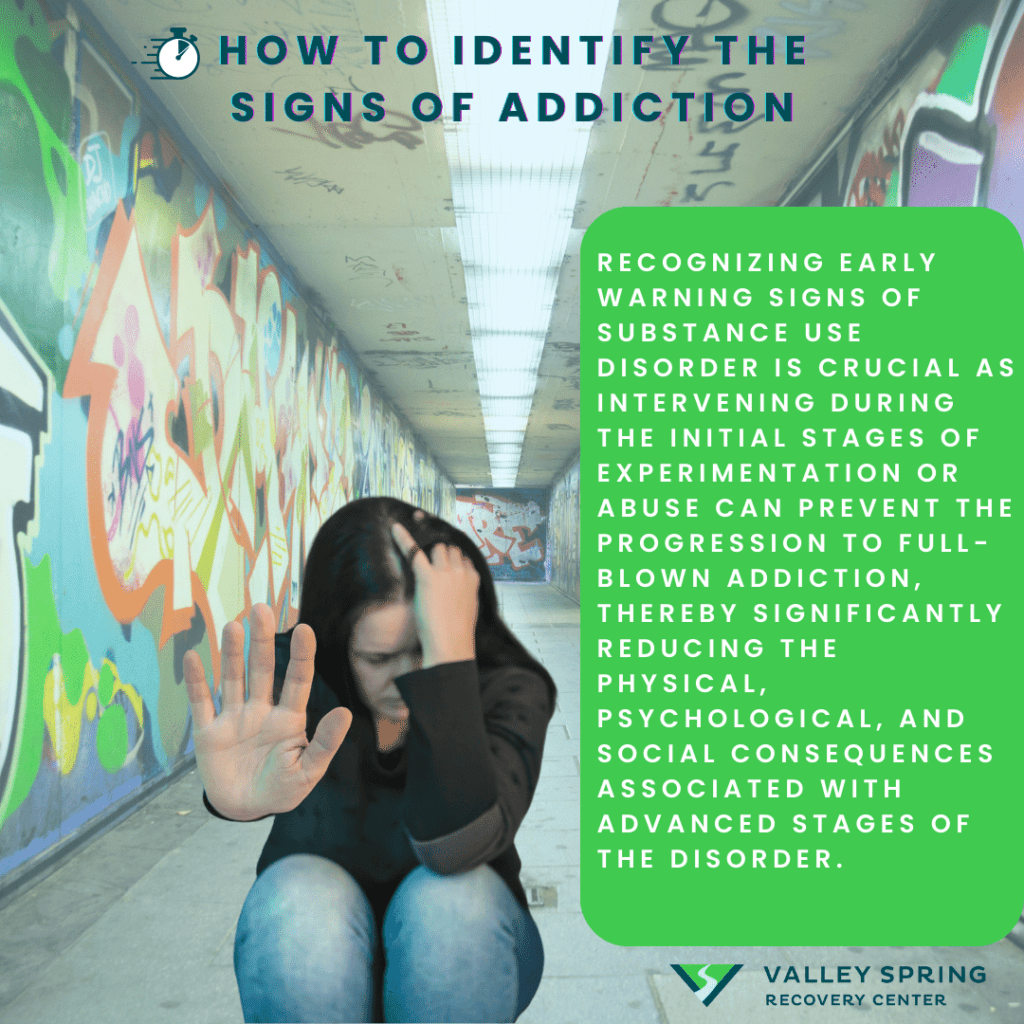
Why Recognizing Early Warning Signs and Symptoms of Substance Use Disorder is Crucial?
Recognizing early warning signs of Substance Use Disorder (SUD) is crucial because early detection and intervention can significantly improve the chances of successful treatment and recovery. Addressing SUD in its initial stages can prevent the progression of the disorder, which can lead to more severe health complications, social and relationship problems, financial difficulties, and legal issues. Early intervention also reduces the risk of long-term physical and psychological damage, improves the individual’s quality of life, and can be lifesaving by preventing potential overdoses or accidents related to substance use. Additionally, it allows friends and family to provide support and seek appropriate help at a stage when the individual might be more receptive to treatment.
If addiction is identified and addressed during the experimentation or abuse stages, it can significantly limit the consequences. Early intervention can prevent the escalation to full-blown addiction, reducing the likelihood of long-term health problems, relationship breakdowns, financial ruin, legal issues, and potential mortality associated with chronic substance use.
Moreover, early intervention can help maintain the individual’s social and occupational functioning, preserve family and social relationships, and reduce the overall burden on healthcare and legal systems. It also opens the opportunity for individuals to develop healthy coping strategies for life stressors, rather than turning to substances for escape or relief.
How Can You Tell if Someone is Developing an Addiction?
Identifying early signs of addiction involves noticing changes in behavior, mood, and physical appearance. Look for shifts such as increased secrecy, changes in social circles, neglect of responsibilities, mood swings, and physical signs like unexplained weight loss or changes in sleep patterns. If someone is using substances, they might also have paraphernalia or show withdrawal symptoms when not using.
What Are the Common Behavioral Changes Seen in Early Addiction?
Early addiction often leads to noticeable behavioral changes. These include neglecting hobbies or activities once enjoyed, withdrawing from family and friends, neglecting personal hygiene, unusual requests for money, and changes in eating or sleeping habits. There may also be a decline in performance at work or school.
Can Mental Health Issues Mask the Signs of Addiction?
Yes, mental health issues can sometimes mask the signs of addiction. Symptoms like mood swings, changes in behavior, and social withdrawal can be common in both scenarios. It’s important to approach the situation with sensitivity and consider a comprehensive evaluation by a mental health professional to distinguish between the two.
Are There Specific Signs of Addiction in Teenagers?
In teenagers, signs of addiction might include sudden changes in friend groups, declining grades, loss of interest in favorite activities, secretive behavior, changes in eating and sleeping habits, and unexplained mood swings. Parents should also be aware of the presence of unfamiliar items that could be related to substance use.
How can Family Members Identify Warning Signs of Addiction in Loved Ones?
In the process of identifying addiction, family members should be aware of the potential health consequences and changes in behavior, as addiction can alter the way individuals interact with their peer groups. The family context holds crucial information about the development and maintenance of Substance Use Disorders (SUDs), influencing treatment effectiveness. Encouragingly, support groups, family therapy, and counseling are valuable resources to enhance treatment outcomes for families coping with mental and substance issues.
When family members notice moodiness, changes in behavior, or health deterioration in their loved ones, prompt action is crucial. Finding help through treatment facilities, programs, and local resources is essential for effective intervention and support. For caregivers dealing with children of parents struggling with addiction, lived experiences can provide valuable insights into the challenges and potential solutions. Residential treatment is one avenue that can offer comprehensive care and support for individuals facing addiction, highlighting the importance of holistic approaches.
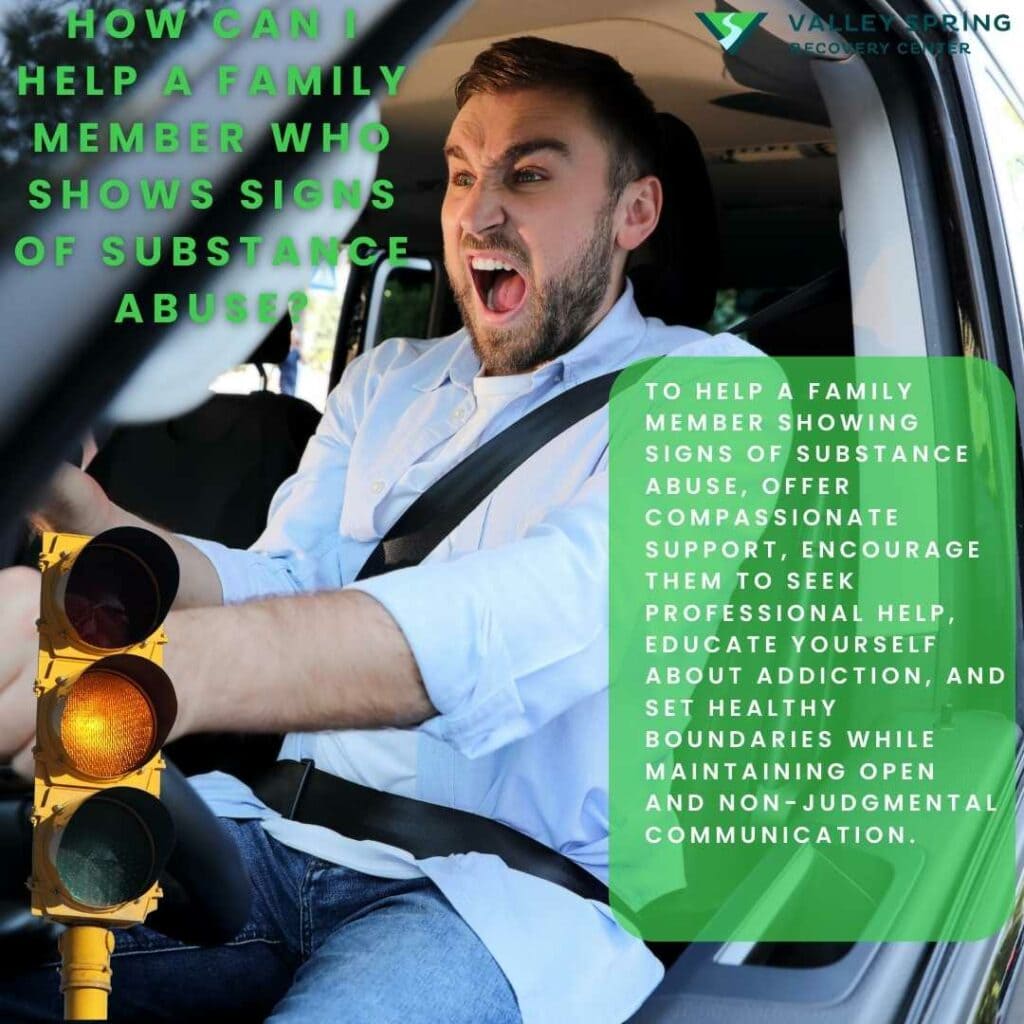
How can I help a family member who shows signs of substance abuse?
SAMHSA advocates for openness to support groups, family therapy, and counseling, providing additional resources for families coping with these challenges.
- Provide emotional support: Substance abuse is often accompanied by emotional and psychological challenges. Be a source of emotional support for your family members by actively listening to their concerns, offering encouragement, and reminding them of their worth. Let them know that they are not alone in this journey.
- Set boundaries: It’s important to establish boundaries to protect both yourself and your family members. Communicate your expectations regarding their substance use and make it clear what behavior is acceptable and what is not. Enforce these boundaries consistently.
- Seek support for yourself: Supporting a loved one with substance abuse can be emotionally draining and challenging. It’s crucial to take care of yourself and seek support from others who understand what you’re going through. Consider joining a support group or speaking with a therapist to help you cope with the situation.
- Encourage healthy habits: Promote activities and behaviors that contribute to a healthy lifestyle. Encourage your family members to engage in regular exercise, eat nutritious meals, and develop healthy coping mechanisms such as meditation, journaling, or hobbies.
- Be patient and understanding: Recovery from substance abuse is a long and often challenging process. Understand that setbacks may occur along the way. Practice patience, empathy, and understanding while maintaining a hopeful outlook.
Remember, you cannot force someone to change or seek help if they are not ready. However, by offering support and resources, you can create an environment that encourages your family members to take the necessary steps toward recovery.
How Do You Approach Someone You Suspect of Having an Addiction?
Approaching someone about a suspected addiction requires sensitivity and care. It’s important to express your concerns without judgment and in a supportive manner. Focus on specific behaviors you’ve observed rather than making accusations. Offer to help them find professional support and assure them of your ongoing support.
Where to Find Help for Substance Abuse and Addiction?
If you or someone you know is struggling with substance abuse or addiction, it’s important to seek help. There are various resources available to assist individuals in finding the support they need. Here are some places where you can find help for substance and addiction:
1. National Helpline: The Substance Abuse and Mental Health Services Administration (SAMHSA) operates a 24/7 National Helpline that provides free and confidential treatment referrals and information for individuals and their families. You can contact the helpline at 1-800-662-HELP (4357).
2. Treatment Locator: SAMHSA also offers an online treatment locator tool called “FindTreatment.gov.” This tool allows you to search for substance treatment facilities in your area based on your specific needs and preferences.
3. Local Support Groups: Joining a support group can provide valuable peer support and guidance. Alcoholics Anonymous (AA) and Narcotics Anonymous (NA) are two well-known organizations that offer support groups for individuals struggling with alcohol or drug addiction. You find local meetings through their websites.
4. Counseling and Therapy: Seeking professional help through counseling or therapy can be beneficial in addressing the underlying issues contributing to substance abuse. A licensed therapist or counselor can help you develop coping strategies and provide support during your recovery journey.
5. Healthcare Providers: Reach out to your primary care physician or a healthcare provider who specializes in addiction medicine. They can provide guidance conduct assessments, and recommend appropriate treatment options.
6. Inpatient or Outpatient Treatment Centers: Depending on the severity of the addiction, inpatient or outpatient treatment programs may be recommended. Inpatient programs provide 24-hour care in a residential setting, while outpatient programs allow individuals to live at home while attending therapy sessions and support groups.
7. Online Resources: There are various online resources available for individuals seeking help for substance abuse and addiction. Websites like SAMSA’s “FindTreatment.gov” and “Recovery.org” provide information on treatment options, support groups, and recovery resources.
8. Employee Assistance (EAP): Many workplaces offer EAPs that provide confidential support and resources for employees struggling with substance abuse. Contact your human resources department to inquire about available services.
Remember, reaching out is the first step towards. There are numerous resources and supportive communities available to assist you in your journey to overcoming substance abuse and addiction.
What Are the First Steps in Seeking Help for Addiction?
The first step in seeking help is acknowledging the problem. From there, consider reaching out to a healthcare provider for an evaluation and recommendations for treatment. Researching local support groups and treatment centers can also be helpful. It’s important to remember that recovery is a journey and requires ongoing commitment.
How Can Addiction Affect Someone’s Professional Life?
Addiction can severely impact professional life, leading to decreased productivity, increased absenteeism, and a higher risk of accidents or mistakes at work. It may also strain professional relationships and can lead to job loss. Seeking help is crucial to prevent these professional repercussions.
What Role Can Friends Play in Supporting Someone with Addiction?
Friends can play a supportive role by encouraging the individual to seek help, offering a listening ear, and providing emotional support. It’s important for friends to stay informed about addiction, set boundaries to avoid enabling behavior and take care of their own emotional needs.
What Are the Stages Leading Up to Drug Abuse?
Drug abuse typically begins with experimentation, which then progresses to drug abuse. During this progression, key signs emerge, signaling a shift from casual use to problematic behavior. These signs include increased frequency of use, dependency on drugs for daily functioning, and neglect of responsibilities.
How Do Drug Abuse and Addiction Differ?
Drug abuse and addiction are stages in the continuum of drug use that reflect the severity of the issue. Abuse involves a pattern of using substances that leads to significant impairment or distress. Addiction is characterized by the inability to stop using the substance despite these consequences, driven by a physical or psychological dependence.
What Are the Warning Signs of a Drug Relapse?
A drug relapse is not an isolated event but a process marked by warning signs that indicate a return to substance use behaviors. Early detection of these signs, such as romanticizing past drug use, reconnecting with old using friends, or skipping therapy sessions, can be crucial for intervention and preventing a full relapse.
Are There Preventative Measures to Avoid Addiction?
Preventive measures include educating oneself about the risks of substance abuse, fostering strong social connections, maintaining a healthy lifestyle, and seeking help for mental health issues. Parents can play a key role in prevention by having open conversations with their children about the dangers of substance abuse. Preventing drug abuse is possible if behaviors are identified early and measures are taken to curb the abuse before it turns into addiction.
What Impact Does Addiction Have on Family and Friends?
Addiction can significantly impact family and friends, often leading to strained relationships, financial difficulties, and emotional stress. Family members and friends of addicts may experience feelings of guilt, anger, frustration, or helplessness. It’s crucial for them to seek support, either through counseling or support groups, to cope with these challenges.
Ben Fisher
All author postsShare This Post

